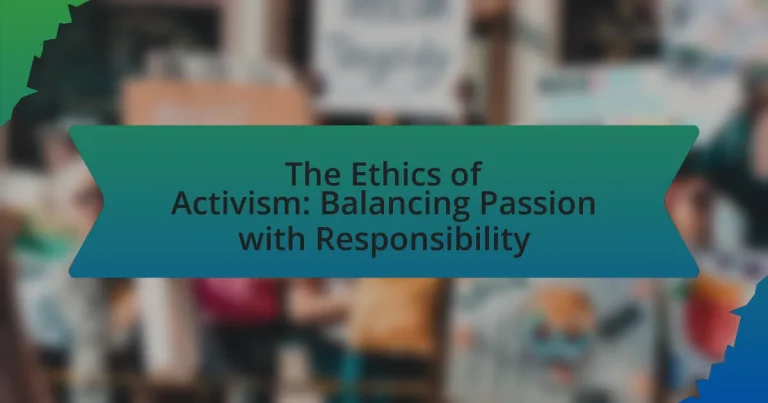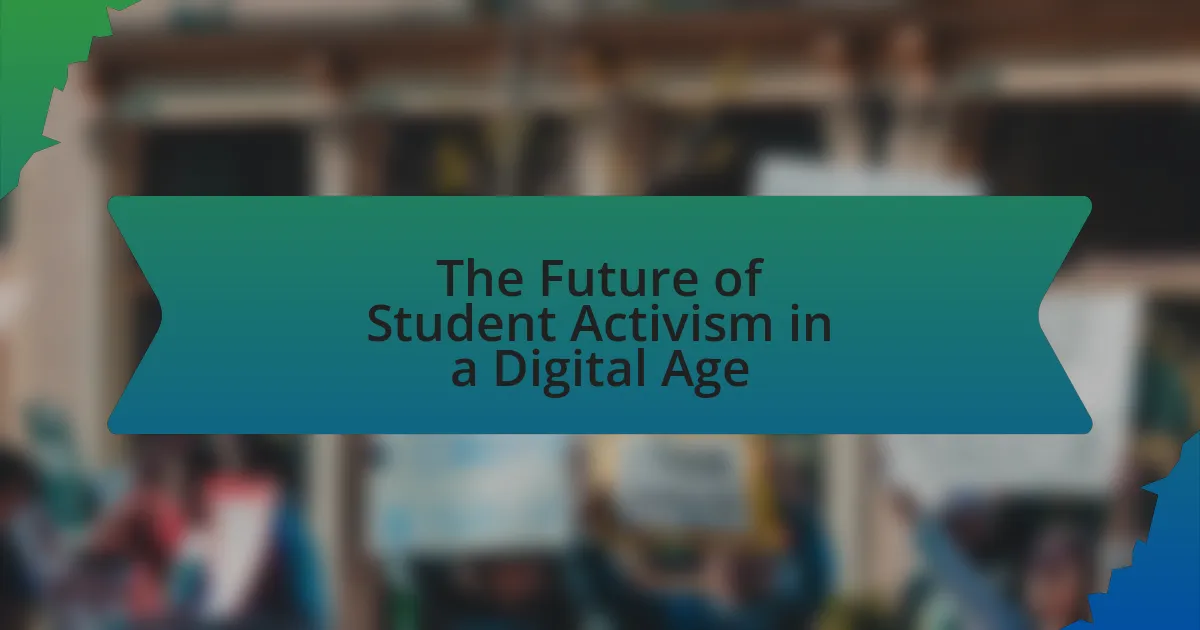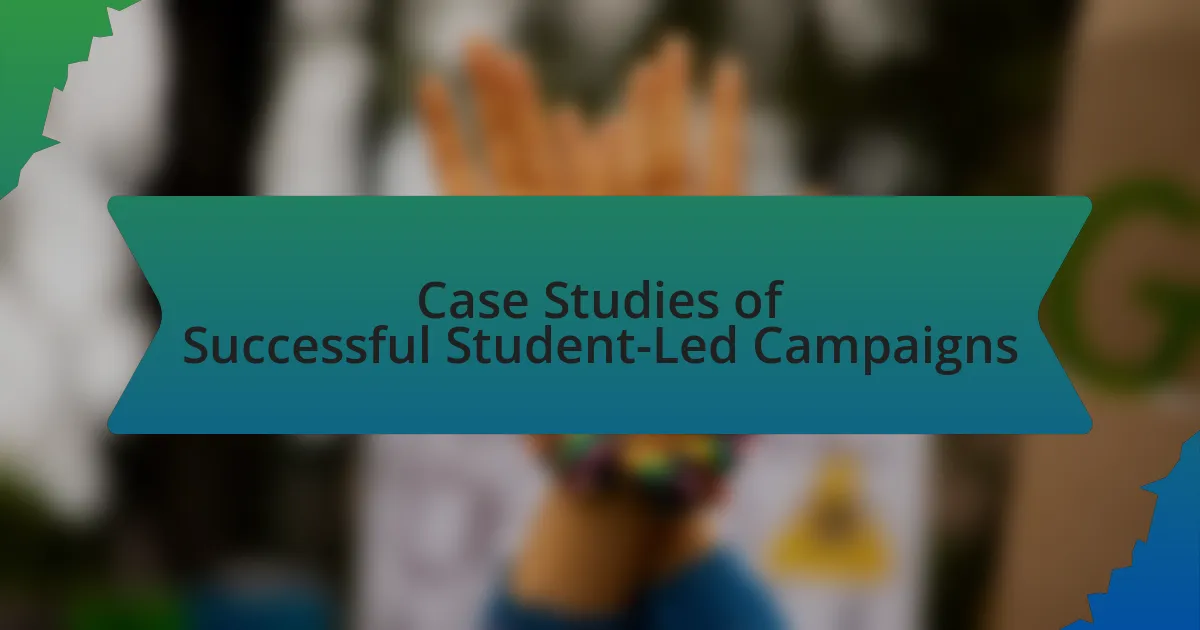The article focuses on the ethics of activism, emphasizing the need to balance passion with responsibility. It outlines fundamental principles of activism, including social justice, grassroots organizing, nonviolent resistance, and community empowerment, while also addressing ethical considerations such as integrity, accountability, and respect for individuals. The discussion highlights the importance of responsible activism, the potential consequences of irresponsible actions, and strategies for ethical engagement, including transparency and collaboration. Additionally, it explores the implications of activism on communities and provides practical tips for activists to maintain their commitment to ethical standards while pursuing social change.
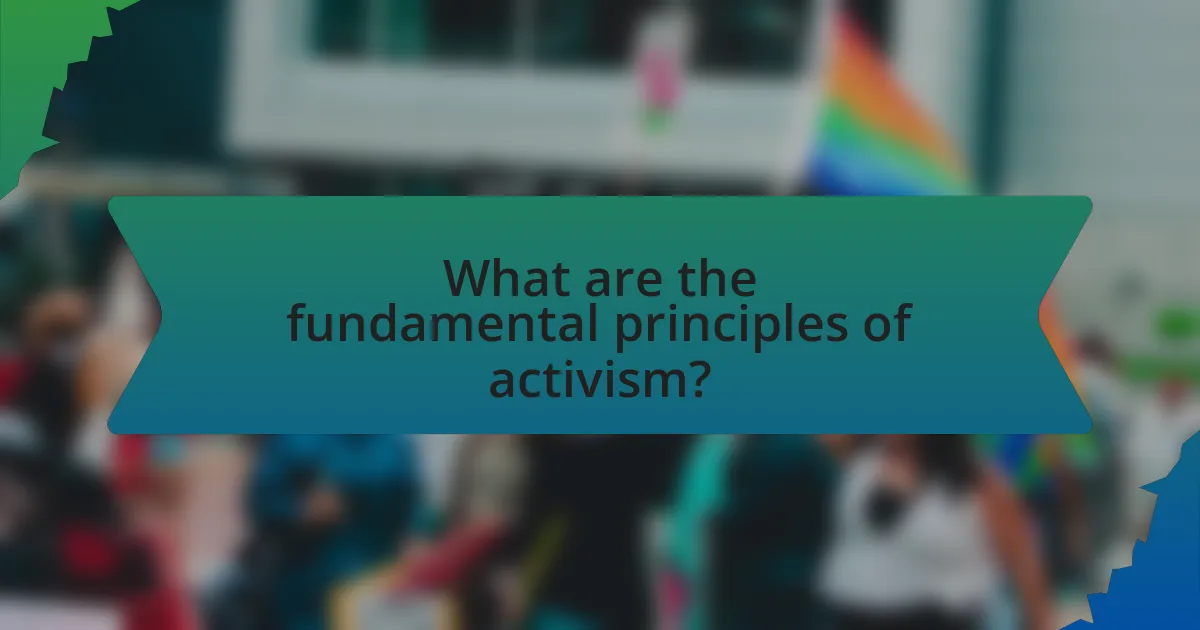
What are the fundamental principles of activism?
The fundamental principles of activism include social justice, grassroots organizing, nonviolent resistance, and community empowerment. Social justice emphasizes the pursuit of equality and fairness for marginalized groups, aiming to address systemic inequalities. Grassroots organizing involves mobilizing individuals at the local level to create change, fostering a sense of community and collective action. Nonviolent resistance advocates for peaceful methods to challenge oppression, as exemplified by figures like Martin Luther King Jr. and Mahatma Gandhi. Community empowerment focuses on equipping individuals with the tools and knowledge necessary to advocate for their rights and influence decision-making processes. These principles are foundational to effective activism, as they guide actions and strategies aimed at creating meaningful social change.
How do these principles relate to ethical considerations?
The principles of activism directly relate to ethical considerations by guiding the actions and motivations of activists to ensure they align with moral standards. Ethical considerations in activism emphasize the importance of integrity, accountability, and respect for all individuals affected by the activism efforts. For instance, the principle of non-violence, which is foundational in many activist movements, underscores the ethical commitment to avoid harm and promote justice without inflicting pain on others. This principle is supported by historical examples, such as Martin Luther King Jr.’s approach during the Civil Rights Movement, which prioritized ethical conduct and respect for human dignity while advocating for social change.
What role does passion play in the ethical framework of activism?
Passion serves as a driving force in the ethical framework of activism by motivating individuals to advocate for social change and justice. This intense emotional commitment can lead to increased engagement and persistence in addressing societal issues, as seen in movements like civil rights and environmental activism. Research indicates that passionate activists often inspire others, creating a ripple effect that amplifies their cause. For instance, the passion exhibited by figures such as Martin Luther King Jr. galvanized support for the civil rights movement, demonstrating how personal conviction can ethically influence collective action. Thus, passion not only fuels individual efforts but also shapes the moral landscape of activism by fostering a sense of urgency and responsibility towards societal improvement.
How can activists ensure their passion does not lead to unethical behavior?
Activists can ensure their passion does not lead to unethical behavior by adhering to a clear ethical framework that prioritizes respect for all individuals and communities. This involves establishing guidelines that promote transparency, accountability, and inclusivity in their actions. For instance, the American Psychological Association emphasizes the importance of ethical decision-making in advocacy, highlighting that activists should consider the potential consequences of their actions on various stakeholders. By engaging in open dialogue with affected communities and seeking their input, activists can align their efforts with the values and needs of those they aim to support, thereby minimizing the risk of unethical conduct.
Why is responsibility crucial in activism?
Responsibility is crucial in activism because it ensures that actions taken are ethical, effective, and considerate of the broader impact on society. When activists act responsibly, they are more likely to engage in informed decision-making, which can lead to sustainable change rather than short-term solutions. For example, responsible activism involves understanding the complexities of social issues, which can prevent the perpetuation of harm or misinformation. Historical instances, such as the civil rights movement, demonstrate that leaders like Martin Luther King Jr. emphasized responsibility by advocating for nonviolent protest, which garnered widespread support and legitimacy for their cause. Thus, responsibility in activism not only enhances credibility but also fosters trust and collaboration among diverse stakeholders.
What are the potential consequences of irresponsible activism?
Irresponsible activism can lead to significant negative consequences, including harm to the cause, backlash against the movement, and legal repercussions. When activists engage in reckless behavior, such as vandalism or violence, they can alienate potential supporters and undermine the legitimacy of their message. For instance, the 2020 protests in the United States saw some instances of looting and violence that detracted from the overall message of racial justice, leading to public criticism and division. Additionally, activists may face legal consequences, such as arrests or fines, which can further hinder their ability to advocate effectively. These outcomes demonstrate that a lack of responsibility in activism can ultimately weaken the movement and its goals.
How can activists balance their passion with a sense of responsibility?
Activists can balance their passion with a sense of responsibility by setting clear goals and adhering to ethical guidelines. Establishing specific, measurable objectives allows activists to channel their enthusiasm into actionable steps while ensuring that their methods align with moral standards. For instance, the American Psychological Association emphasizes the importance of ethical considerations in advocacy, highlighting that responsible activism involves understanding the potential impact of one’s actions on communities and individuals. By prioritizing informed decision-making and engaging in reflective practices, activists can maintain their fervor while fostering accountability and respect for diverse perspectives.
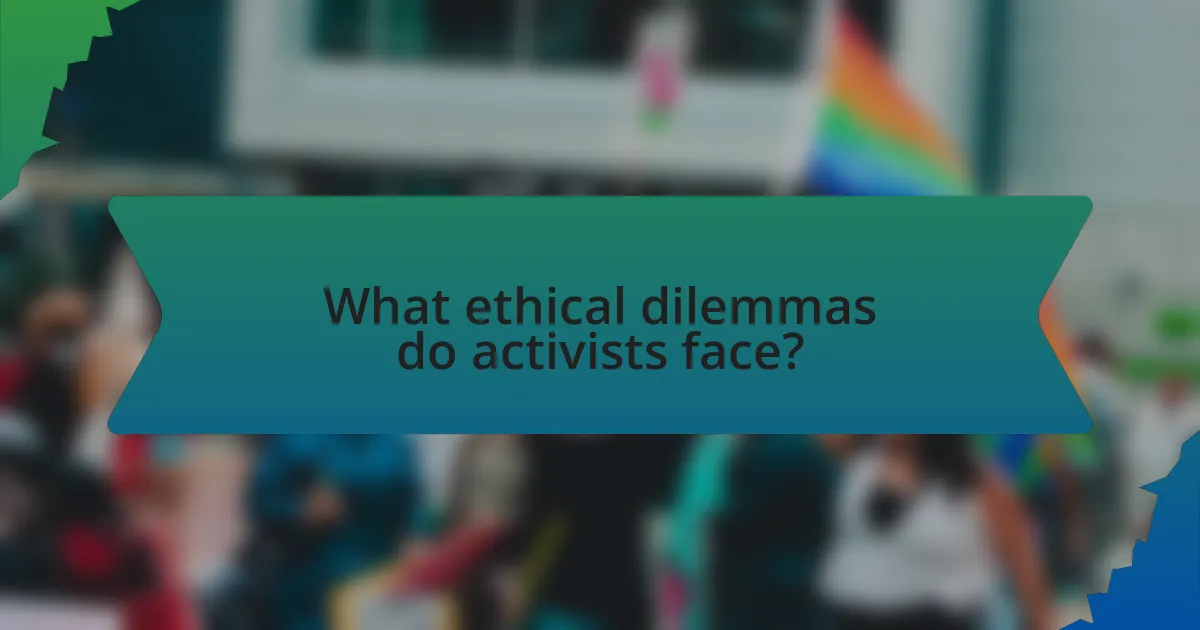
What ethical dilemmas do activists face?
Activists face ethical dilemmas such as the conflict between achieving their goals and adhering to moral principles. For instance, activists may struggle with the decision to use civil disobedience, which can lead to legal consequences, versus maintaining lawful behavior that may limit their impact. Additionally, activists often grapple with the implications of their actions on vulnerable populations, weighing the potential benefits of their advocacy against the risks of harm or exploitation. Research indicates that these dilemmas can lead to significant internal conflict, as activists must navigate the complexities of their motivations and the consequences of their strategies.
How do activists navigate conflicts between personal beliefs and societal norms?
Activists navigate conflicts between personal beliefs and societal norms by employing strategies such as dialogue, education, and coalition-building. These methods allow activists to articulate their beliefs while addressing societal expectations. For instance, activists often engage in community discussions to foster understanding and challenge prevailing norms, as seen in movements like the Civil Rights Movement, where leaders like Martin Luther King Jr. emphasized nonviolent communication to bridge gaps between differing viewpoints. Additionally, research indicates that successful activism often involves forming alliances with diverse groups, which can amplify their message and create a broader base of support, thereby facilitating a more effective challenge to societal norms.
What strategies can be employed to resolve these conflicts?
To resolve conflicts in activism, strategies such as open dialogue, mediation, and collaborative problem-solving can be employed. Open dialogue encourages all parties to express their views and concerns, fostering understanding and reducing tensions. Mediation involves a neutral third party who facilitates discussions, helping to identify common ground and potential solutions. Collaborative problem-solving focuses on working together to find mutually beneficial outcomes, which can enhance relationships and promote a sense of shared responsibility. These strategies are effective as they promote communication and cooperation, essential elements in addressing conflicts within the ethical framework of activism.
How can activists remain true to their values while engaging with diverse perspectives?
Activists can remain true to their values while engaging with diverse perspectives by actively listening and seeking common ground without compromising their core beliefs. This approach allows activists to understand differing viewpoints, fostering dialogue that respects their values while promoting inclusivity. Research indicates that effective communication and empathy can lead to more productive discussions, as seen in the work of social psychologists who emphasize the importance of perspective-taking in conflict resolution. By balancing their commitment to their values with openness to others’ experiences, activists can create a more collaborative environment that encourages mutual respect and understanding.
What are the implications of activism on communities?
Activism significantly impacts communities by fostering social change and raising awareness about critical issues. Through organized efforts, activists can mobilize community members, leading to increased civic engagement and participation in democratic processes. For instance, the Civil Rights Movement in the United States resulted in landmark legislation, such as the Civil Rights Act of 1964, which transformed societal norms and improved the legal standing of marginalized groups. Additionally, activism can create a sense of solidarity among community members, enhancing social cohesion and collective identity. Studies have shown that communities engaged in activism often experience improved mental health outcomes and a stronger sense of belonging, as individuals unite for a common cause.
How can activism positively impact community development?
Activism can positively impact community development by fostering social change and empowering individuals to address local issues. Through organized efforts, activists raise awareness about community needs, mobilize resources, and advocate for policy changes that benefit the public. For instance, grassroots movements have successfully influenced legislation on environmental protection, housing rights, and education reform, leading to improved living conditions and increased civic engagement. Research by the Stanford Social Innovation Review highlights that communities with active civic engagement experience higher levels of trust and collaboration, which are essential for sustainable development.
What are the risks of activism leading to community division?
Activism can lead to community division by creating polarized groups that oppose each other on specific issues. This polarization often results in a breakdown of communication and mutual understanding, as individuals align themselves with factions that reinforce their beliefs while alienating those with differing perspectives. For instance, research by the Pew Research Center indicates that political activism can exacerbate social divides, with individuals increasingly identifying with their ideological groups rather than seeking common ground. Additionally, community members may experience social isolation or hostility from those who disagree with their activism, further entrenching divisions.
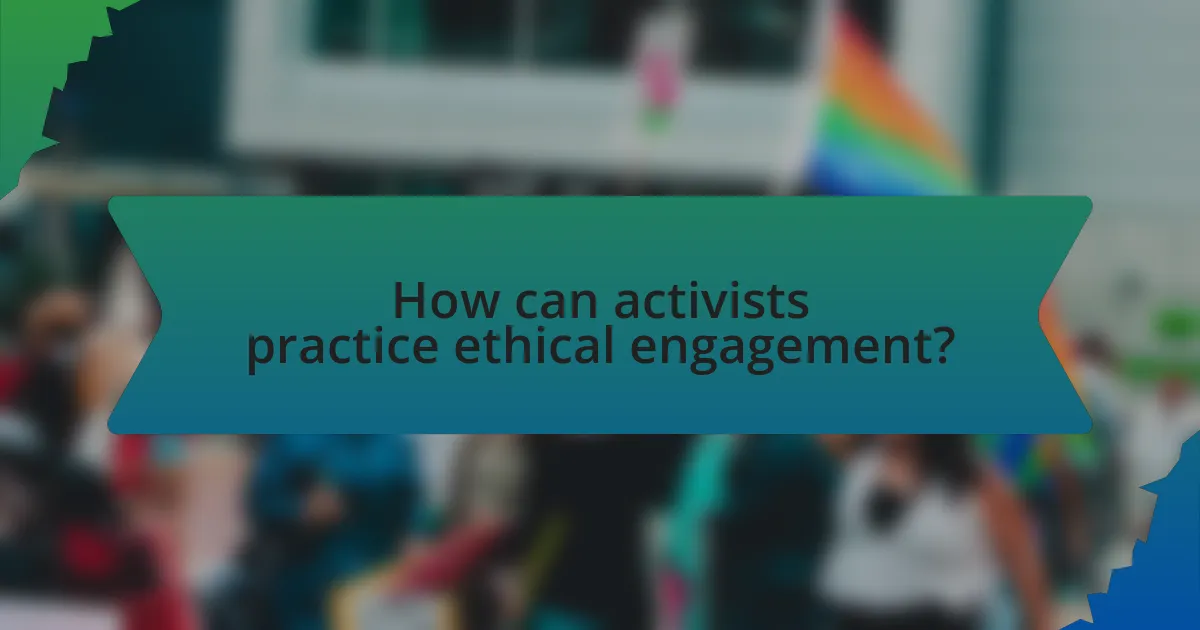
How can activists practice ethical engagement?
Activists can practice ethical engagement by prioritizing transparency, respect for all individuals, and inclusivity in their actions. Transparency involves openly sharing goals, methods, and funding sources, which builds trust and accountability within communities. Respect for individuals means acknowledging diverse perspectives and experiences, ensuring that all voices are heard and valued, particularly those from marginalized groups. Inclusivity requires actively involving a broad range of stakeholders in decision-making processes, which fosters a sense of community ownership and shared responsibility. Research indicates that ethical engagement leads to more sustainable and effective activism, as seen in movements that prioritize these principles, such as the Civil Rights Movement, which successfully integrated diverse voices to achieve significant social change.
What are the best practices for ethical activism?
The best practices for ethical activism include prioritizing transparency, respecting the rights and dignity of all individuals, and engaging in nonviolent methods. Transparency ensures that activists communicate their goals, funding sources, and methods clearly, fostering trust and accountability. Respecting the rights and dignity of individuals involves listening to marginalized voices and ensuring that activism does not harm those it aims to help. Nonviolent methods, supported by historical evidence such as the success of the Civil Rights Movement, demonstrate that peaceful approaches can lead to significant social change without causing harm or escalating conflict.
How can transparency enhance the ethical standards of activism?
Transparency enhances the ethical standards of activism by fostering accountability and trust among stakeholders. When activists openly share their methods, funding sources, and decision-making processes, they create an environment where actions can be scrutinized and evaluated. This openness reduces the likelihood of unethical practices, such as manipulation or misinformation, which can undermine the credibility of the movement. For instance, a study published in the Journal of Business Ethics found that organizations demonstrating transparency are perceived as more trustworthy, leading to increased support from the public and stakeholders. Thus, transparency not only strengthens the ethical framework of activism but also promotes greater engagement and collaboration within communities.
What role does collaboration play in ethical activism?
Collaboration is essential in ethical activism as it enhances the effectiveness and reach of advocacy efforts. By working together, activists can pool resources, share knowledge, and amplify their voices, leading to more impactful campaigns. For instance, the collaboration between various environmental organizations during the Paris Agreement negotiations in 2015 demonstrated how united efforts can influence global policy on climate change. This collective action not only strengthens the movement but also ensures diverse perspectives are represented, fostering a more inclusive approach to activism.
What tools and resources can support ethical activism?
Digital platforms, educational resources, and community networks are essential tools and resources that support ethical activism. Digital platforms like social media enable activists to raise awareness and mobilize support quickly, while educational resources, such as online courses and webinars, provide knowledge on ethical practices and strategies for effective advocacy. Community networks foster collaboration and solidarity among activists, enhancing their collective impact. For instance, organizations like Amnesty International offer toolkits and guidelines that emphasize ethical considerations in activism, ensuring that actions align with human rights principles.
How can activists utilize social media responsibly?
Activists can utilize social media responsibly by ensuring that their messaging is accurate, respectful, and inclusive. Responsible use involves fact-checking information before sharing to prevent the spread of misinformation, which can undermine credibility and harm the cause. Additionally, activists should engage in constructive dialogue, fostering a respectful environment that encourages diverse perspectives. Research indicates that online harassment can deter participation in activism; therefore, promoting a positive and supportive online community is essential. By adhering to these principles, activists can effectively leverage social media to advance their causes while maintaining ethical standards.
What educational resources are available for ethical activism training?
Educational resources for ethical activism training include online courses, workshops, and literature focused on ethical practices in activism. Organizations such as the Center for Ethical Leadership offer training programs that emphasize ethical decision-making and responsible advocacy. Additionally, platforms like Coursera and edX provide courses on social justice and activism that incorporate ethical considerations. Books such as “The Activist’s Handbook” by Aidan R. McGarry also serve as valuable resources, outlining ethical frameworks and strategies for effective activism. These resources collectively equip individuals with the knowledge and skills necessary to engage in activism responsibly and ethically.
What are practical tips for balancing passion with responsibility in activism?
To balance passion with responsibility in activism, individuals should prioritize self-care, set clear goals, and engage in collaborative efforts. Self-care is essential to prevent burnout, as studies show that activists who practice self-care maintain their effectiveness over time. Setting clear, achievable goals helps focus efforts and measure progress, ensuring that passion translates into tangible outcomes. Engaging in collaborative efforts fosters a sense of community and shared responsibility, which can enhance the impact of activism while distributing the emotional and logistical burdens among participants.
